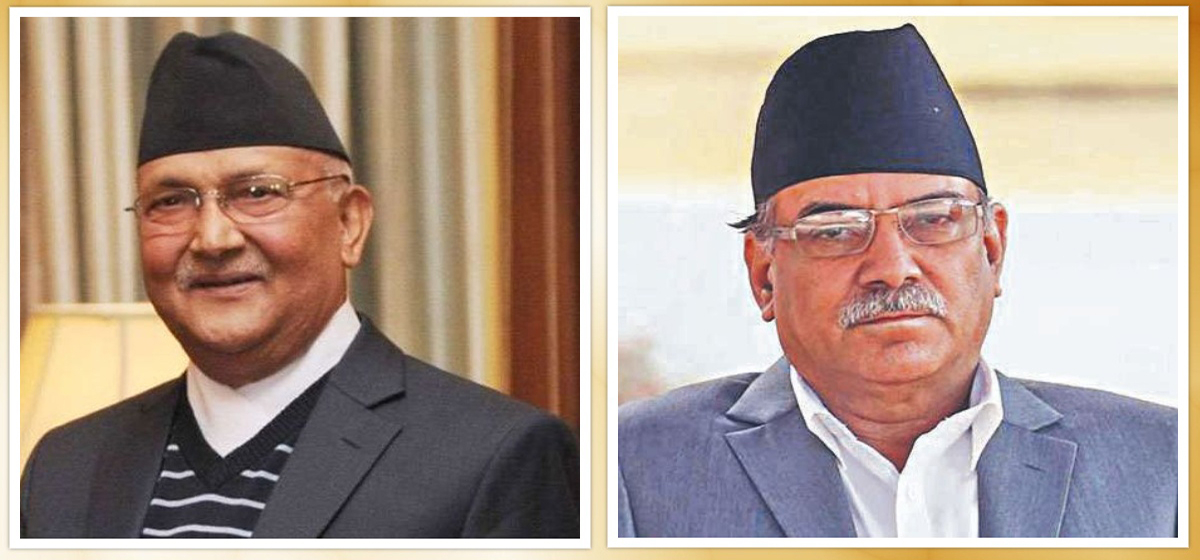KATHMANDU, Nov 8: CPN-UML Chairman K P Oli and CPN (Maoist Center) Chairman Pushpa Kamal Dahal jointly unveiled the two parties' joint election manifesto giving special emphasis to political stability and economic prosperity.
The manifesto has stressed political stability and peace in the country for economic prosperity and safeguarding of the national interest. “Economic development and prosperity will be achieved based on peace and political stability in the country,” reads the manifesto.
The manifesto has repeatedly attempted to project the left alliance as a nationalist force formed to bring prosperity and political stability to the country. Explaining the need for the alliance, the manifesto has mentioned that “Nepal should no more remain least-developed, poor, backward, dependent and suppressed country and situation of risking the national freedom, sovereignty and geographical integrity should end.” Defending the alliance of the left political parties, the manifesto has stated that the alliance is based on constitutional ground.
The joint-manifesto has acknowledged the contribution of the Maoist insurgency in bringing the federal democratic republic system in the country. Earlier, CPN-UML had strong objection against accepting the Maoist insurgency as a change movement. As a result, the preamble of the new constitution has only stated the word armed conflict to describe the Maoist insurgency.
Left alliance for stability and development: Chair Dahal

Refuting the accusation from the rival alliances and parties of being aggressive against the southern neighbor, India, the left alliance has stressed on maintaining balanced relationship with both India and China without tilting to any side.
“We won't tilt to any side for development, we will maintain balanced relationship with both the neighbors,” said UML Chairman Oli in the manifesto-unveiling function. Claiming that forces are working to spread misunderstanding among the neighbors, he promised to maintain good relation with India and China. “Both India and China are bigger than us, our relationship with those countries is important for us. Though some forces try to create misunderstanding they won't succeed,” Oli added.
On a separate note, Oli stressed revitalizing the South Asian Association for Regional Cooperation (SAARC) for enhancing mutual assistance and cooperation among the South Asian countries. “Nepal has failed to play effective role as SAARC chair. Nepal can work as mediator to ease tensions in the South Asian region. We are not for fueling tension we are for easing soured relations,” said Oli.
Indicating the soured relation between India and Pakistan Oli said that Nepal should play the mediator role for dialogue between the two countries.
With rival parties accusing the alliance of trying to impose communist governance system in the country, the manifesto has stressed multiparty democracy based on socialism. “We won't let the democratic values to be infringed, we believe in democracy,” Oli added. “There is big hue and cry in other parties after this alliance is announced, will democracy be strong if we continue infighting?”
In a tall promise, the left alliance has promised to make per capital income USD 5,000 within 10 years from existing $ 862. In addition, the alliance has promised to make the mountains of Nepal secure for scaling and welcoming five million tourists in next 10 years. The left alliance has also envisioned discovering more tourist destinations and developing new trekking routes.
Oli also reiterated to operate own ships in the sea. Oli said, “People mock of our plan to operate own ships, we should own ships and transport our goods via sea, we can make a profit. Can't a landlocked country operate its ships?” The manifesto has also promised to make the country self-reliant in food, fish, meat, eggs and dairy products. Likewise, the manifesto has also proposed increasing investments in agriculture, energy, infrastructure development and tourism.
UML-Maoist alliance has proposed development of transmission lines, construction of railway and fast-track highways, concluding Kathmandu-Tarai fast track within four years. The manifesto has proposed Kerung-Kathmandu-Pokhara-Lumbini railway and linking capital cities of all seven provinces by four to six-lane highways.
Similarly, the manifesto has also promised to create one million jobs within 10 years establishing new industries in the country. The alliance has also sstressed qualitativeeducation and economical medical facility. The manifesto has also stated that one percent amount of gross domestic product will be invested for science and technology.
Explaining the highlights of the manifesto Maoist Chairman Dahal refuted allegations against the alliance. “Rumors have been spread against this alliance by the other political parties, we don't comment on it now, we will refute the wrong illustrations of this alliance on the ground,” said Dahal.




































